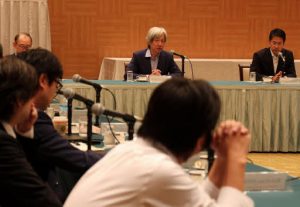Hiroshima Round Table opens with experts from nine nations discussing path towards denuclearization
Aug. 22, 2019
by Yumie Kubo, Staff Writer
On August 21, the Hiroshima Round Table, a meeting of experts to discuss a path towards nuclear disarmament in East Asia, opened at a hotel in Naka Ward, Hiroshima. A total of 24 experts in nuclear disarmament or diplomacy have gathered from nine nations including Japan, the United States, South Korea, and Switzerland. The participants will exchange views for two days on the subject of how denuclearization could be pursued.
Hidehiko Yuzaki, the governor of Hiroshima Prefecture and the host of the meeting, delivered a speech and stressed that nuclear disarmament efforts have suffered setbacks and global conditions are now severe, given the termination of the Intermediate-Range Nuclear Forces (INF) Treaty on August 2 and other developments. He said, “In order to make sure that all nations pursue serious efforts to abolish nuclear weapons, it’s important to propose a new approach to security that doesn’t rely on nuclear arms. I hope the Hiroshima Round Table will become a big driving force that can impact the international community.” Kiichi Fujiwara, a professor of international politics at the Graduate School of the University of Tokyo and the chair of the meeting, also offered remarks and shared his concern, saying “The option of using nuclear weapons has become more of a reality.”
Four participants then reported on the results of their research. Shen Dingli, a professor from Fudan University in China, assessed the instability seen in the relations between the United States and Russia, as well as the United States and China, and said that it was important to consider how the risks of deteriorating relationships among nations can be reduced. Beyza Unal, a senior research fellow from the Royal Institute of International Affairs (also known as Chatham House) in the United Kingdom, argued that state-of-the-art technology such as artificial intelligence (AI) must be taken into account when contemplating the idea of nuclear deterrence.
Regarding the Treaty on the Prohibition of Nuclear Weapons that was adopted at the United Nations, Titti Erasto, a researcher at the Stockholm International Peace Research Institute (SIPRI) in Sweden, stressed the necessity of having an international framework to verify the treaty. Shuhei Kurisaki, an associate professor from Waseda University, said that researchers across the world have created new momentum for a theory of nuclear deterrence that could coexist with nuclear disarmament initiatives.
Discussions at the event’s general meeting and sectional meetings will be closed to the public so that the participants can engage in a frank exchange of opinions, according to the Hiroshima prefectural government’s Peace Promotion Project Team. On August 22, the results of the discussions will be announced as the chairman’s summary, which will be submitted to next spring’s Nuclear Non-Proliferation Treaty (NPT) Review Conference. The Hiroshima Round Table has been held each year since 2013, in line with the prefectural government’s “Hiroshima for Global Peace” plan.
(Originally published on August 22, 2019)
On August 21, the Hiroshima Round Table, a meeting of experts to discuss a path towards nuclear disarmament in East Asia, opened at a hotel in Naka Ward, Hiroshima. A total of 24 experts in nuclear disarmament or diplomacy have gathered from nine nations including Japan, the United States, South Korea, and Switzerland. The participants will exchange views for two days on the subject of how denuclearization could be pursued.
Hidehiko Yuzaki, the governor of Hiroshima Prefecture and the host of the meeting, delivered a speech and stressed that nuclear disarmament efforts have suffered setbacks and global conditions are now severe, given the termination of the Intermediate-Range Nuclear Forces (INF) Treaty on August 2 and other developments. He said, “In order to make sure that all nations pursue serious efforts to abolish nuclear weapons, it’s important to propose a new approach to security that doesn’t rely on nuclear arms. I hope the Hiroshima Round Table will become a big driving force that can impact the international community.” Kiichi Fujiwara, a professor of international politics at the Graduate School of the University of Tokyo and the chair of the meeting, also offered remarks and shared his concern, saying “The option of using nuclear weapons has become more of a reality.”
Four participants then reported on the results of their research. Shen Dingli, a professor from Fudan University in China, assessed the instability seen in the relations between the United States and Russia, as well as the United States and China, and said that it was important to consider how the risks of deteriorating relationships among nations can be reduced. Beyza Unal, a senior research fellow from the Royal Institute of International Affairs (also known as Chatham House) in the United Kingdom, argued that state-of-the-art technology such as artificial intelligence (AI) must be taken into account when contemplating the idea of nuclear deterrence.
Regarding the Treaty on the Prohibition of Nuclear Weapons that was adopted at the United Nations, Titti Erasto, a researcher at the Stockholm International Peace Research Institute (SIPRI) in Sweden, stressed the necessity of having an international framework to verify the treaty. Shuhei Kurisaki, an associate professor from Waseda University, said that researchers across the world have created new momentum for a theory of nuclear deterrence that could coexist with nuclear disarmament initiatives.
Discussions at the event’s general meeting and sectional meetings will be closed to the public so that the participants can engage in a frank exchange of opinions, according to the Hiroshima prefectural government’s Peace Promotion Project Team. On August 22, the results of the discussions will be announced as the chairman’s summary, which will be submitted to next spring’s Nuclear Non-Proliferation Treaty (NPT) Review Conference. The Hiroshima Round Table has been held each year since 2013, in line with the prefectural government’s “Hiroshima for Global Peace” plan.
(Originally published on August 22, 2019)








